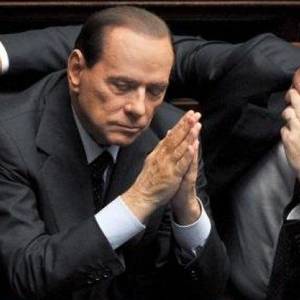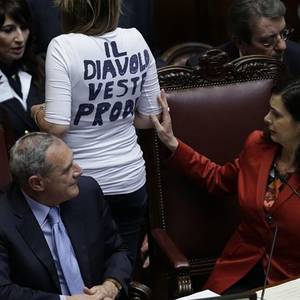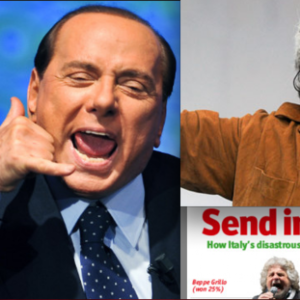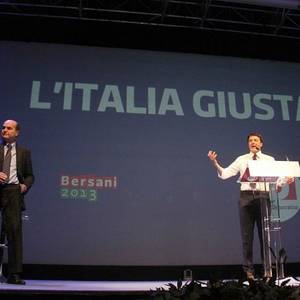Because he is over 70 years of age, Silvio Berlusconi will not actually go to prison for the coming year, but will serve his sentence either under house arrest or re-education at the hands of social workers. His passport will be confiscated, and for six years he cannot run for public office. A crucial question is whether he will be forced to resign his Senate seat or will choose to resign beforehand. As Berlusconi himself said, in an emotional TV monologue just hours after his conviction of fiscal fraud Thursday, the judges "have come down on me without precedent. But I am staying on the playing field."
Although apparently on advice of his lawyers, Berlusconi had said repeatedly in recent weeks that the government would remain intact whatever the trial outcome. On Friday, however, he made an about-face after hours of tense meetings in Rome with his closest party aides. The outcome: Berlusconi now says that his ministers will withdraw from the government, precipitating new elections, perhaps as soon as October. Because President Giorgio Napolitano has the faculty to grant Berlusconi an amnesty, the threat of collapsing the government amounts to prompting Napolitano to salvage the government so as to avoid the expense and - as many believe - futility of new national general elections only months after the last.
You chose: berlusconi
-
-
At 8:04 pm Silvio Berlusconi, 77-year-old former premier, learned from the TV set in his huge apartment within Palazzo Grazioli, just steps away from Palazzo Venezia in Rome, that the Italian high court, the Cassations, had come down on him, but softly enough that he can breathe a deep sigh of relief. And so can today's left-leaning premier, Enrico Letta, who heads a government in tandem with Berlusconi's Partito della Liberta' (PdL). Convicted to a four-year sentence which is unlikely to be served, he will be retried, however, on the question of his possible interdiction from public office.
-
Election of a new president remained a will o' the wisp on Day Two of the vote. At 7 pm the joint parliamentary session was suspended after Romano Prodi received only 395 votes - 109 fewer than necessary to be elected to succeed Giorgio Napolitano. Behind Prodi was Stefano Rodota' with 214 votes and, farther in the distance, Anna Maria Cancellieri, who has been serving as Interior Minister under the emergency government of Mario Monti (78 votes), followed distantly by Massimo D'Alema (15). Tomorrow a new vote takes place, but at this point, no one is making any guesses as to the outcome save that new national general elections remain a serious risk, and an expensive prospect.
-
Right and left in Italy agree on the gravity of the problem. "The house is on fire," thundered Angelino Alfano, titular secretary of the rightist Freedom Party (PdL). "Italy is starting to be frightened - yes, frightened," intoned the moderate leftist professor Ernesto Galli della Loggia, writing in Corriere della Sera. Both lament the politicians' failure to move toward formation of a new government. But there agreement ends, and the impasse over what to do to avoid a dangerous power vacuum continues. Fighting to gain time as the end of his mandate approaches, President Giorgio Napolitano has appointed a 10-man committee of "sages" to try to excogitate points of convergence on reforms.
-
One month after Italy's national general elections, Pier Luigi Bersani, leader of the Partito Democratico (PD), is trudging up a political Mount Everest whose peak hides, invisible, in the clouds. When President Giorgio Napolitano tapped him last week to begin testing the ground for creation of a new government, in essence Bersani was asked to resolve the three-way split that pits his PD against both the rightist Liberty Party (PdL) of former Premier Silvio Berlusconi and the forces of self-righteous, angry Beppe Grillo. Can that three-way split be resolved? These are crucial questions as the vote for the the presidency looms a few scant weeks away.
-
The March 2 Economist magazine has Italy on the cover and the headline: "How Beppe Grillo and Silvio Berlusconi threaten the future of Italy and the euro." The charge: "Confronted by the worst recession in their country since the 1930s and the possible implosion of Europe's single currency, the people of Italy have decided to avoid reality." A better way to put it is that some here have failed to grasp reality because reality is complex. A government that can handle the economic crisis, and the social crisis implicit in it, is necessary, but which government?
-
New York City and Italy have a great deal in common, starting and ending with self-destructive electorates; voters who are intent on putting into office people who, in one way or another, hold them in contempt. In both democracies, The People are generally too ignorant and self-absorbed to notice that the pain they feel is self-inflicted. How does this happen?
-
In Italy's most important national general elections in half a century, turnout is expected to be low by the usual standards, but the stakes are extraordinarily high, and begin with the search for finding ways and means to stimulate the economy. And can the pre-election battle lead to a functional coalition?
-
Good grief, the Italian national general elections are only two weeks away, and things are happening so thick and fast that the only way to keep up is with a daily diary of the goings-on.
-
As Leonardo Sciascia once said, it is easy to manage wealth, but hard to manage misery. These are tough times for Italy as elsewhere, and the sight of shops shutting down and factory closures is the elephant in the room of the national general elections just three weeks away. All this is serious enough, but is further aggravated by the daily revelations of the financial shenanigans at the world's oldest bank, the Monte di Paschi (MPS) of Siena, where huge losses were craftily concealed while managers are under investigation for allegedly enriching themselves (the scandals refer to the previous, not the present management, in office just one year).







































